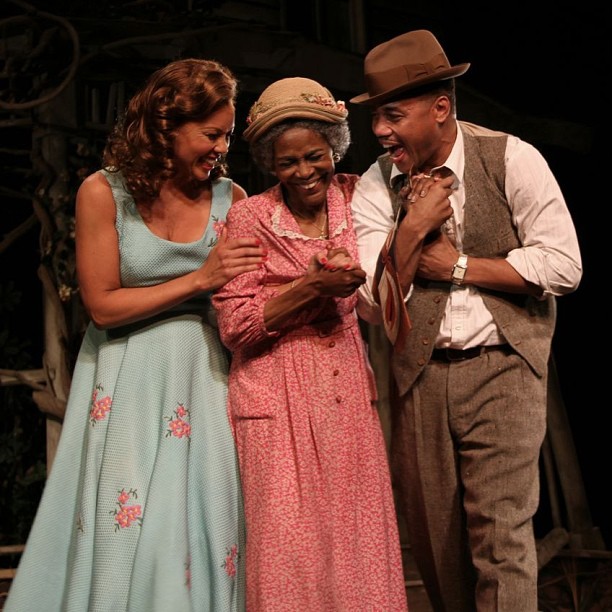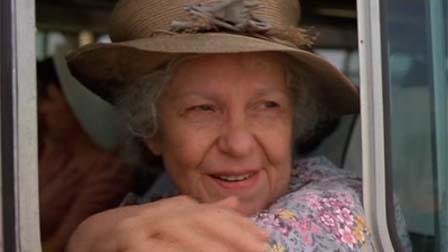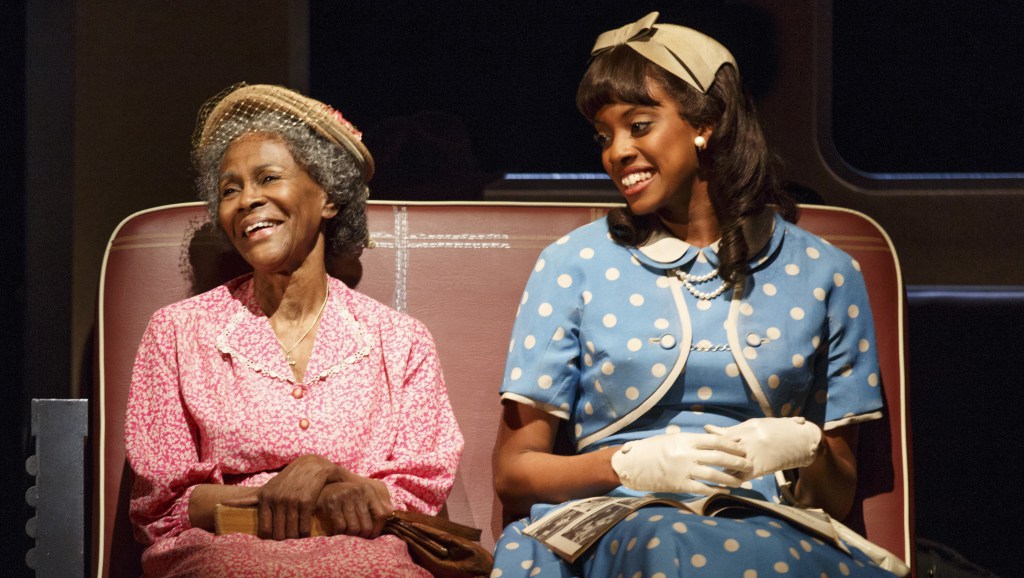Stage Door: "Trip to Bountiful"
 Monday, April 29, 2013 at 10:16PM
Monday, April 29, 2013 at 10:16PM Dancin’ Dan here. The Tony Nominations come out tomorrow and Nathaniel will be discussing them along with a couple new plays he's seen. He has yet to see this one, though.
I have been a lifelong lover of live theater. As much as I love movies, nothing beats the experience of seeing a play or musical live on stage. Even at its worst, there is still an intangible quality to watching a story unfold right in front of you at the same time you are watching. At its best, though, that turns into something transcendent – there is something about watching a person really live a moment while you watch that is indescribable. In the new Broadway revival of Horton Foote’s The Trip to Bountiful with Cicely Tyson and Vanessa Williams (and Cuba Gooding, Jr.), there were two moments when the power of live theater asserted itself so strongly that I wept.

The first moment is by far the broadest in Tyson’s wonderful, Tony-worthy performance. Having almost reached her childhood home of Bountiful, TX, Tyson’s Carrie Watts finds herself in a bus station with a young friend she made on the bus (a lovely Condola Rashad). First, she breaks out into the hymn “Blessed Assurance”, clapping and swaying like a revival preacher. Then, only a couple of minutes later, she drags Rashad through the dance she remembers doing at the first social dance she went to, which just so happened to be in the very town in which they find themselves. It isn’t merely the sight of the eighty-something Tyson singing and dancing up a storm that moved me, but the transfer of energy between audience and performer that can only take place during a live performance. As Tyson went on, the audience was right alongside her, clapping along and willing her into a bigger, more energetic display. Tyson was all too happy to oblige, alight with a glow from within, sending the audience’s energy right back out to them, earning every bit of the ovation she received. It was truly a sight to behold. [more...]
The second great theatrical moment of the play comes when Carrie finally makes it to Bountiful. Having journeyed with her over the course of two hours from the cramped, airless apartment she shares with her son Ludie (Gooding) and his wife Jessie Mae (Williams), to the small bus where she shares tender moments with Rashad’s young army bride, we have come to really know Carrie. We want to see her get to Bountiful before she dies – just to see it, to breathe the fresh air and see the birds she loved so much. And when she enters the stage and looks around what used to be her home, it’s a magical moment. A spark emerges from behind her eyes. Her gait changes from an old lady’s shuffle to an assured walk, with a kind of strength we have not seen in her before. Watching Tyson play this moment onstage – gazing at the house, placing a hand on it, sitting on the front stoop – I couldn’t help but be glad that this was not a flim.

Don’t get me wrong. I’ve seen the 1985 film version of Bountiful for which Geraldine Page won an Oscar, and it’s perfectly fine. Page’s performance is excellent. But nothing can compare to watching a moment like this unfold in front of you in real time, to watch the emotions play unfettered across Tyson’s face and body, to not be able to look away. Tyson plays the role more naturalistically than Page, and the light hand she uses goes a long way toward giving this production something more like a happy ending than any other version I’ve seen. Because of this, the play does lose some of its power, but it becomes something different entirely – exactly the thing that good revivals should do.
Another big part of turning this Bountiful from a meditation on death to a nostalgic memory play is Vanessa Williams’s turn as Jessie Mae. Usually a hateful character, Williams somehow finds a human heart in the cold self-centeredness that defines the character (it also helps that she’s clearly a cinephile, unable to tear herself away from her movie magazines and bragging to “Mother Watts” about how when she first moved to Houston she “saw three picture shows in one day.”), showing us that Jessie Mae is essentially a good person who cares for Ludie and Carrie, even if she doesn’t show it. Williams has a certain blowsy theatricality even in her more subtle moments, but it works here as a foil for Tyson’s grounded naturalism – Carrie and Jessie Mae are oil and water and will never mix well.
I wish I could say that Cuba Gooding, Jr. lives up to his female co-stars. He doesn’t. In every line of every scene, he is simply trying too hard – changing up his voice here, adopting nervous tics with his hands there – his acting is effortful, and what’s worse, the seams show. Condola Rashad, though, is a very open and engaging stage presence, her big eyes telling us everything we need to know about her character instantly. Her scenes with Tyson are at the center of this revival, and the two actresses make them sing.
 Cicely Tyson takes a trip
Cicely Tyson takes a trip
This production belongs, though, to Cicely Tyson. She finds humor far in excess of what is on the page, and she’s an active, interesting listener for all her scene partners. Some going into this “all-black” revival (with two notable white exceptions) might be disappointed that the production doesn’t go deeper into what life may have been like for African-Americans living in Texas in the 1930s-50s, but sometimes all a revival of a play needs to be is an opportunity to see a great actress tear into a great part. Thankfully, Tyson knows that this delicate blossom of a play needs care in order to fully bloom, and instead of tearing into the part, she carefully peels away the layers, until in that glorious final scene, she shows us the glowing, beating heart of Carrie Watts. It’s a heart so full of love that the audience overflows with it, giving even more right back to her. And when Cicely Tyson (back on Broadway after over thirty years) comes out for her final bow, you can see that love exploding from inside her, happily sharing it with the whole theater – cast and crew included. That’s the magic happening in the Stephen Sondheim Theater eight times a week.
Have you seen The Trip to Bountiful, on stage or on film? Share your memories in the comments.



Reader Comments (7)
I have seen the film several times. Geraldine Page was simply one of the greatest actresses ever and she makes the film a beautiful and moving experience, I can't imagine her performance being matched on film.
But it is so true that live performance is such a different beast, I've never seen this particular play staged but there are many other times where I wasn't crazy about the film version, Guys and Dolls and Brighton Beach Memoirs come to mind, but found incredibly involving on stage. This was particularly true of Brighton Beach and it was all about the performers pulling me in and bringing their characters to life on that stage.
I haven't seen it in a long time, but I remember loving Geraldine's performance. I assume Cicely is already the Tony front-runner. I would love to cherish her, but I've seen so little of her career.
Does the story change a lot considering that now is a black woman in the 40s?
Denny-thanks so much for writing this. It's been a number of years since I've seen the film, but I saw the stage version with Tyson two weeks ago, and I agree-the moment where she lays eyes on Bountiful is just beautiful. I love the way that her awe of the place transfers to us-taken on its own, we would have seen a rundown house and assumed she'd be disappointed, that Bountiful wasn't what she hoped, but since Tyson comes out at the same time as the house, we never have that moment where we think she'll be disappointed-we just feel the love of all of the memories she's shared there. It's a testament to Tyson's work that she can so instantly make us identify with her, as well as instantly put ourselves in her shoes, remembering our own childhood homes.
This production has been nominated as best play revival, as well as the performances of Tyson and Rashad.
Lovely review. Cicely Tyson is an incredible talent and I hope that I have the opportunity to see her in 'Bountiful.'
As wonderful as Liza Minnelli is in 'Cabaret,' I think that Tyson was every bit as deserving of the Best Actress Oscar for 'Sounder.' Her work in 'The Autobiography of Miss Jane Pittman' is brilliant, too.
Peggy Sue - the story doesn't change AT ALL despite the change in ethnicity of the main characters. At first I was a little disappointed with this because the setting of the piece offers fertile ground for shedding some light on the African-American experience, but the performances are so strong on their own terms that I ended up not minding the loss of that opportunity. It's good to know that the piece stands on its own however a director decides to cast it.
John - thanks! I actually held my breath during that moment, it was so thrilling to watch!
Troy - I am THRILLED at those nominations! However, I would have swapped out Condola Rashad's nomination for Featured Actress for Vanessa Williams, who has a trickier part and does some really wonderful things with it. Rashad is lovely, though.
Too far away to catch this one, but I was really hoping for some love for Vanessa. Condolo does seem lovely (and good on her for consecutive nods), but Vanessa is such a strong talent relegated to parts recently below her worth it would have been nice to see her get some love with this.
(I always play the "if only" game with her - If only she'd not gotten pregnant and had been able to play Queenie for LaChiusa, would she have a Tony yet?)